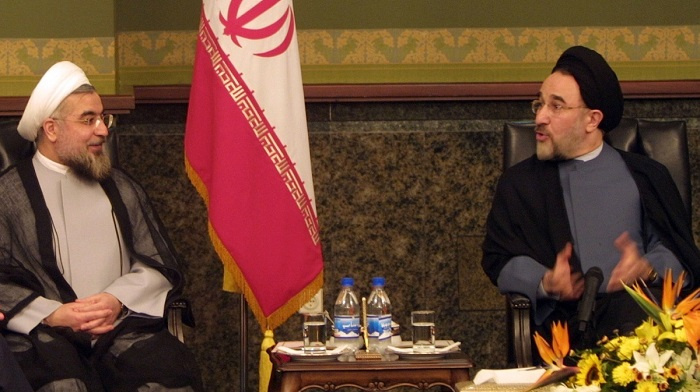Will Rohani’s Second Administration Face the Fate of Refomist Khatami’s?

Attacks on the Rouhani administration, which is on the threshold of a second term, is doubtlessly reminiscent of the days Mohammad Khatami was planning to form his cabinet for a second term. Then too, the level of attacks targeting Khatami and his cabinet members had been so intense that one could say hardliners had Khatami pinned throughout his presidential term.
Iran's political atmosphere has been tense and radicalized after the results of the recent presidential race were announced. This seems to be caused by radical propaganda from the Principlist camp and its candidate. Remaining in the air are claims of violations in the election, the resurfaced Crescent-Iran contract, a debate about plagiarism in Rouhani's doctoral thesis, and so on and so forth.
These have raised concerns that Principlists want to keep the polarized atmosphere up until parliamentary elections, so that they could tear into their successive defeats in every election in the last four years. The memories of Khatami's presidency are being relived, with the many similarities undeniably affecting public opinion. After the eighth presidential election, the atmosphere had become too tense and violent for the sitting president. Khatami, who had almost no interest for reelection because of attacks and slanders from certain institutions and pressure groups, entered the race after insistence by some of his close allies.
After his victory however, the situation became even worse. Attacks on his person and cabinet were deteriorated on the one hand, and certain institutions blocked the administration's different efforts on the other hand, leading to a public frustration regarding Khatami. Of course, this was started before the seventh parliament election in 2004.
At the time, the Guardian Council's sweeping disqualification of pro-reform MPs had tightened the grip on Khatami. On the other hand, the propaganda succeeded in reducing trust in Khatami to a great extent. People's embrace of the Reformist front was declining, as quickly as Khatami's endurance was. In February 2004, the people sulked with politics in the parliamentary elections, registering a record low popular participation rate.
That is how the Reformists lost the parliament, handing leadership over to the Principlists and hardliners. Even prior to that, the Guardian Council made up for the absence of Principlists in the parliament, rejecting again and again upon pretexts such contradiction with Sharia and the Constitution, Khatami's so-called Twin Bills that called for election reforms and more power for the president.
On the one side stood accusations against the administration, repeatedly popping up by opponents, while physical crackdowns against university students increasingly led to the notion that the administration failed to provide them with security. Moreover, the seventh parliament was yet another obstacle on the way of reform. This went so far that Khatami chose to withdraw his Twin Bill in protest to avoid further tension.
The tactic is on the agenda for the opponents of the administration once again. The operation was launched with the codename ‘violation’, after the election results were announced, to put Rouhani administration into the defensive and convince public opinion that the administration has gained majority through violations.
This could be the beginning of a game which aims to not only isolate Rouhani but also help win the eleventh legislative elections. It explains why the Principlists' first post-election step is to bring up the issue of infringements during May 19th voting so fiercely. Another line pursued by groups inside the Principlist camp, particularly those close to the hardliner Paydari front, is to form a shadow cabinet, relying on the 16 million votes they received in this election.
Despite repeated denials of the administration, Principlists also continue to fuel controversy over the so-called 2030 Document, UNESCO's Global Education agenda, saying it legitimizes moral corruption and sexual perversion in Iran’s educational system. The state-run TV has offered its airing time to the opponents of the administration, who in turn use the opportunity to promote their false interpretation of the universal document. While Parliament Speaker Ali Larijani has announced that a parliamentary committee in charge of adjusting bills with the constitution has found no fault in the agenda, the state-run TV has turned into the organ of administration opponents, paving the ground to provoke public opinion against UNESCO 2030 agenda.
Will Principlists succeed in reenacting the 2001-2005 period? Reformist analyst Sadegh Zibakalam has an answer for the question. He told Fararu in a recent interview that Rouhani is not Khatami, just in the same way that today is different from the 2001-2005 period. "The hardliner faction of the Principlists wants to keep the pressure on Rouhani and the twelfth administration but this is not a common goal among the Principlists," he said. The Principlists camp is split into two factions and is not uniform as it was during Khatami's presidency, he added. He mentioned the likes of Larijani, Bahonar, and Mesbahi Moghaddam as moderate Principlists who back Rouhani. "If they could restrain Khatami, it was because of their unanimity. A single voice was heard from the camp and that was opposition with Khatami. Therefore, they cannot implement the same tactic today, and expect to succeed".
* This piece was originally published in Fararu. Parts of the article have not been translated.

